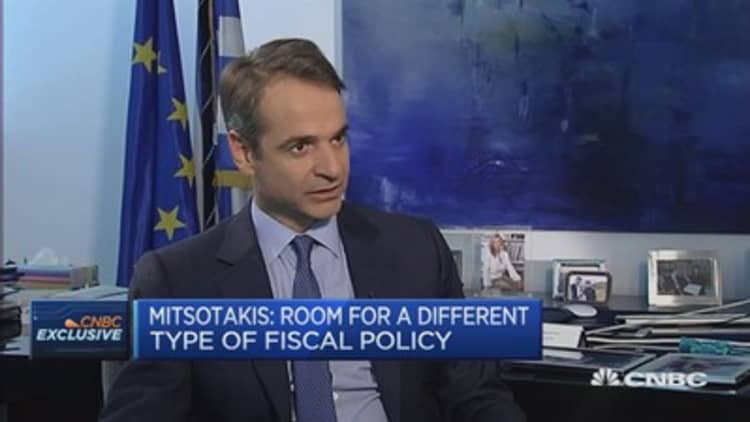
Greek voters are heading to the polls Sunday for the first time since the height of its financial crisis.
Opinion polls suggest that the center-right and conservative party New Democracy (ND) will be forming the next government, potentially with an outright majority in parliament. If proven right, the 2019 general election is set to close the book on the populist rhetoric of current Prime Minister Alexis Tsipras.
"During 2010-2014, the Greek people suffered heavily from high taxes, squeezed salaries and pensions, climbing unemployment and a broadly failing economy. People's despair resulted in wide protests in the streets, and the Greeks were seeking for the culprits; the far-left Alexis Tsipras appeared to be their savior at this time," Athanasia Kokkinogeni, Europe senior analyst at consulting firm DuckerFrontier, told CNBC via email.
Back in 2015, Tsipras and his leftist Syriza party won the election with a promise of confronting the EU and ending austerity in a country that, since 2010, had been at the mercy of international creditors.
Tsipras' first group of ministers and its confrontational tone did not go down well in Brussels. Tsipras ended up calling a snap election later that year, winning it, and presenting a fresh team and ultimately achieving a stable work relationship with the country's creditors.
"Sooner than later, the swift deterioration of the economy compelled Tsipras to compromise with creditors' demands," Kokkinogeni said.
The country ended its third consecutive bailout program last August, under Tsipras' leadership and the country's finance minister Euclid Tsakalotos.
According to Kokkinogeni, the 2019 general election "might not be the end of Greek populism but casts doubt among the public about the ability of Greek populists to deliver on the promises during tumultuous times."
Who's the frontrunner?
Kyriakos Mitsotakis, who heads up New Democracy, is poised to lead Greece for the next four years.
Speaking to CNBC back in February, Mitsotakis promised to bring down taxes for domestic and international businesses in what he described as "aggressive and comprehensive tax reform."
"This is something we can deliver within the first month (in office)," Mitsotakis said.
His victory could be a welcome development for investors.
"Mitsotakis signaled that once in office he will focus his efforts on lowering the tax burden on firms and households (property, corporate tax, and VAT), improving the business environment to attract foreign investment, and hastening the restructuring of the banking system, in contrast to Syriza's narrower focus on welfare expenditure," Eurasia analysts said in a note on Wednesday.
"Though ND has not released a detailed and comprehensive reform program, renewed focus on growth-enhancing reforms will be positive for markets and creditors alike," the political analysis firm said.

Market performance
The yield on Greece's 10-year government bond has come down significantly since 2015. The higher the yield, the higher the risk associated with that country.
Jonas Floriani, director at AXIA Ventures, told CNBC last week that it's hard to see yields moving even lower on the result of the elections, given that they are already quite low compared to their level at the beginning of the year.
Floriani also told CNBC that ultimately the risk is smaller in Greece than in Italy — where the government has pushed for higher spending and has been on a collision course with the EU.



